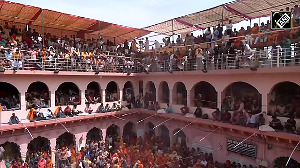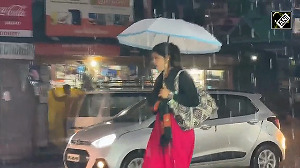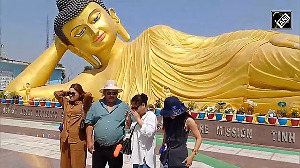Renewed football violence in Italy has led officials to consider whether social issues are the real cause of the problem rather than traditional football rivalries.
- Top names may shun Italy: Kaka
Sunday's riots were partly aimed at police after an officer shot a Lazio fan, which police say was accidental.
Atalanta's match with AC Milan was abandoned because fans tried to smash a stadium barrier and not because of fighting between groups of supporters.
The Italian Soccer Federation has suspended Sunday's Serie B and C games as a mark of respect and to defuse any remaining tension. There is no top-flight Serie A this weekend because Italy visit Scotland in a Euro 2008 qualifier.
However, federation president Giancarlo Abete has been keen to point out that football is not the real enemy.
"Soccer does not carry all the responsibility, the events on Sunday are a social problem," he told reporters.
Corruption probes involving football officials -- especially the match-fixing investigation that led to Juventus being demoted two seasons ago -- happen more often in Italy than in other European leagues and have alienated some fans.
Anger against authorities extends further to government institutions and the police, with Interior Minister Giuliano Amato saying on Tuesday the hooligans had used the fan's shooting as an excuse to renew their war on police.
Regional tensions also play a role in football trouble with fans from Italy's more prosperous north and much poorer south sometimes clashing over social status as much as football.
Chants of "terroni" (pejorative term for peasants) aimed at southerners are often heard at stadiums.
Sundays are dominated by football in Italy and some young men with nothing better to do can get sucked into soccer even if their true intent is causing trouble.
OFFENSIVE CHANTS
Immigrants are not as common on the streets as they are in France or Britain, for example, and comments from some Italians can sound xenophobic to some in Europe.
Many of the 'ultra' groups loosely attached to clubs have a political leaning, with the majority distinctly right wing.
Most are not violent but offensive chants and banners are often heard and seen at matches, encouraging a degree of intolerance which would shock fans in Germany or even England, where soccer officials have worked hard to cut down on racism.
There are fewer black players in Serie A than some other top European leagues and "monkey" chants insulting coloured players still occur. Romania and Fiorentina forward Adrian Mutu is sometimes called a "gypsy".
Politicians worry that the fabric of a society based on strong family values has been torn and that violent elements are using football as an outlet.
"Probably some of us, if not all, must be re-educated that other people are sacred. Today our country seems to have lost respect for the limits. But we don't have to be like ostriches," Education Minister Giuseppe Fioroni told reporters.
When violence does break out, like in Rome on Sunday when a police barracks was trashed, or when an officer was killed in riots in Catania in February, it is often away from stadiums.
Even European football's governing body UEFA has a view on the root of Italy's hooligan problem.
"It reflects social difficulties in Italian cities which have little to do with football, and also the presence of extremists and organised groups do not reflect what the average fan feels about football," UEFA's William Gaillard told the BBC.
"Football has a central place in the life of Italy, so whatever problems exist at a social level find their way to the stadium."








 © 2025
© 2025